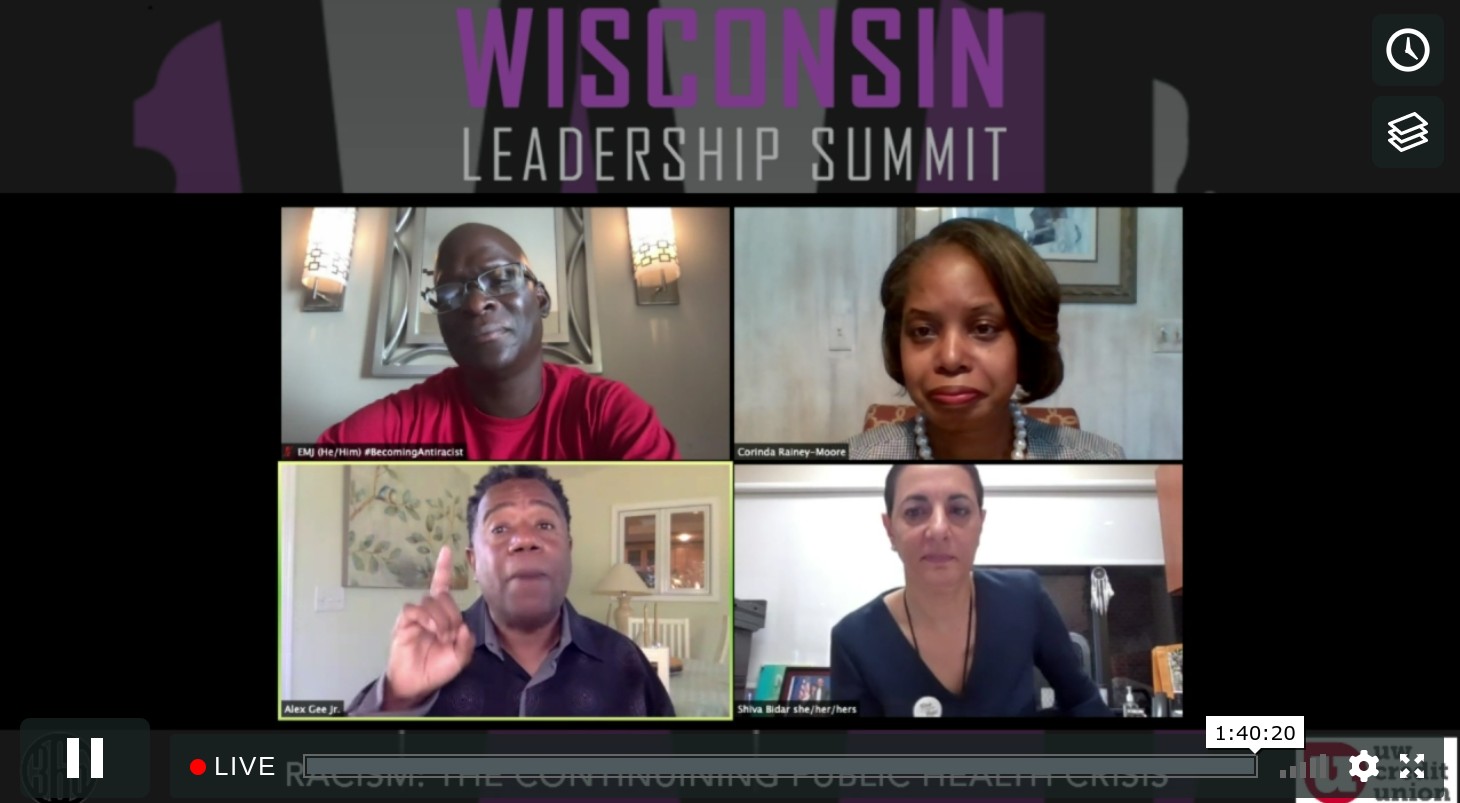
Several Wisconsin leaders discussed racism in the health context –– with a focus on the coronavirus and its disproportionate effect on Black and brown communities –– during the Wisconsin Leadership Summit last week.
“Racism: The Continuing Public Health Crisis” was moderated by Corinda Rainey-Moore, a community engagement manager at UnityPoint Health Meriter with a panel featuring Shiva Bidar-Sielaff, chief diversity officer of UW Health, lead Pastor Reverend Dr. Alex Gee and the founder and program director of White Privilege Conference, Dr. Eddie Moore Jr.
The hour-long panel and Q&A was held Thursday morning and was one of the 25 panels at the summit.
The session started with a look into how the panelists saw COVID-19 affecting Black and brown communities, particularly those that had preexisting conditions. Bidar-Sielaff said she saw the disparity on a daily, often looking at the hospitalization rates in Dane County.
“I think the reason [there] are disparities is because we have had a complete failure of systems that have to protect our Black and brown communities,” she said. “We know that our Black and brown communities are put in positions where they have no protections in their workplaces, or they don’t feel that they can’t really raise the issues that they need to raise as far as safety.”
Bidar-Sielaff also noted how underlying health conditions made it easier to catch the virus and be hospitalized.
“I see where we are now as completely bringing together these conversations around racism as a public health crisis, and as a much bigger public health crisis that we’ve had for a long time, and we have not talked about,” she said.
“The numbers don’t lie,” Moore said. “I just think it’s really important to understand when we’re looking at COVID-19, in the realities of the numbers, I mean, the message is clear. We all know that because it feels to me that if it was a crisis, the reaction would be very different. When a hurricane hits the overwhelming reaction is comprehensive and is a different level of consciousness. And I’m just not sure I’m seeing that.”
In addition to the onset of COVID-19 on public health, the panelists also discussed how racism was a public health concern.
Dr. Gee feels racism everyday, he said. In fact, he felt it a few weeks ago when he was leading a training for white allies, he said. During the training, a person came on, took over the virtual call, called Dr. Gee “the n-word” and wrote “KKK” multiple times on the chat board, he said.
“The FBI and local police had to get involved and the people in the training were trying to end it and I said ‘no no no, stay on and be allies,” he said. “I was fine but the next day and the day after that, I felt off. I’m not devastated that someone thinks that way –– it’s the reality that others get to see now. So I’m just wondering, was that [person] a judge? Was that a probation officer? An elected official? Or are they going to become that? It’s not so self-contained with us, I think that’s what makes it such a health crisis.”
“We feel it even when you don’t say it,” Rainey added. “That is what the stress of lawlessness does to us physically, to our bodies, and we don’t even always think about it, and know it.”
Still, while the panelists did agree that racism was a public health concern, the act of states declaring so was simply not enough, Dr. Gee said.
“It means absolutely nothing. My fear is that as more and more states are saying this, it means one more state can get money so that they can study us and not necessarily help us. Unless it trickles down to how we teach and train health providers, it don’t mean crap,” he said.
Throughout the panel, there were sentiments of “doing something different” with people in positions of power and public health. What exactly that “different” thing is, meant shifting investments and funding entirely, Bidar-Sielaff said.
“We can’t continue funding the same things over and over as we’ve done because it’s built the system that it’s built,” she said. “We need to have people step back and let researchers who are for and above their community actually do the research and not just be part of [the research]. Also, it is about shifting the way that corporations and organizations that give to the community do their funding. So really being engaged in saying ‘we are actually going to actively say that we are going to invest in organizations led by people of color doing work in their own communities.’”
Rainey also encouraged people who wanted to be allies to work harder at unlearning for themselves without relying on Black or brown people to help them.
“There is no distinction between folks who are addicted to substances just like there are folks who are addicted to racism. People have to put in the work to get over that addiction. It’s not about us telling you what to do or how to do it, do your own research and put in the work,” Rainey-Moore said.



